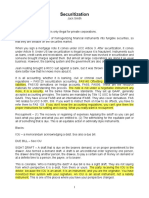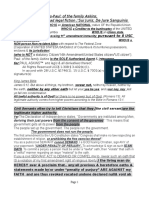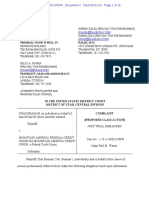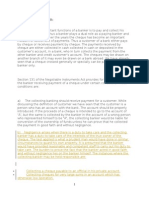0 ratings0% found this document useful (0 votes)
111 viewsAcceptance For Value Law and Legal Definition
Acceptance For Value Law and Legal Definition
Uploaded by
pauldawalllAcceptance for value is a commercial right that is obtained through instruments such as tax bills and violation tickets. It is a qualified endorsement or modified signature on an instrument. By accepting an instrument for value, one becomes the holder in due course of the instrument and can enforce the instrument on the issuer.
Copyright:
© All Rights Reserved
Available Formats
Download as DOC, PDF, TXT or read online from Scribd
Acceptance For Value Law and Legal Definition
Acceptance For Value Law and Legal Definition
Uploaded by
pauldawalll0 ratings0% found this document useful (0 votes)
111 views1 pageAcceptance for value is a commercial right that is obtained through instruments such as tax bills and violation tickets. It is a qualified endorsement or modified signature on an instrument. By accepting an instrument for value, one becomes the holder in due course of the instrument and can enforce the instrument on the issuer.
Original Title
Acceptance for Value Law and Legal Definition
Copyright
© © All Rights Reserved
Available Formats
DOC, PDF, TXT or read online from Scribd
Share this document
Did you find this document useful?
Is this content inappropriate?
Acceptance for value is a commercial right that is obtained through instruments such as tax bills and violation tickets. It is a qualified endorsement or modified signature on an instrument. By accepting an instrument for value, one becomes the holder in due course of the instrument and can enforce the instrument on the issuer.
Copyright:
© All Rights Reserved
Available Formats
Download as DOC, PDF, TXT or read online from Scribd
Download as doc, pdf, or txt
0 ratings0% found this document useful (0 votes)
111 views1 pageAcceptance For Value Law and Legal Definition
Acceptance For Value Law and Legal Definition
Uploaded by
pauldawalllAcceptance for value is a commercial right that is obtained through instruments such as tax bills and violation tickets. It is a qualified endorsement or modified signature on an instrument. By accepting an instrument for value, one becomes the holder in due course of the instrument and can enforce the instrument on the issuer.
Copyright:
© All Rights Reserved
Available Formats
Download as DOC, PDF, TXT or read online from Scribd
Download as doc, pdf, or txt
You are on page 1of 1
Acceptance for Value Law and Legal Definition
Acceptance for value is a commercial right that is obtained through instruments such as tax bills and
violation tickets. It is a qualified endorsement or modified signature on an instrument. By accepting an
instrument for value, one becomes the holder in due course of the instrument and can enforce the
instrument on the issuer.
As per U.C.C. § 3-303, an instrument is issued or transferred for value if:
1) the instrument is issued or transferred for a promise of performance, to the extent the promise has
been performed;
2) the transferee acquires a security interest or other lien in the instrument other than a lien obtained by
judicial proceeding;
3) the instrument is issued or transferred as payment of, or as security for, an antecedent claim against
any person, whether or not the claim is due;
4) the instrument is issued or transferred in exchange for a negotiable instrument; or
5) the instrument is issued or transferred in exchange for the incurring of an irrevocable obligation to a
third party by the person taking the instrument.
Acceptance and Acceptance for Value is not same. Accepting an instrument without a qualified
endorsement waives all defects there may be in the instrument, including the value, or lack of value, that
comes with it. Accepting an instrument for value and returning it is notice to the issuer that the endorser
is not providing new value, but is converting the issuer’s obligation to pay the instrument into the value,
thereby making the instrument negotiable.
Acceptance by Silence Law and Legal Definition
Acceptance by silence is a type of acceptance of a contract. Generally a
contract cannot be accepted by silence. However, a contract will be
considered as accepted even in case of silence in the following cases:
1. in case of past dealings of the parties;
2. in case if the offeror has waived communication by indicating that acceptance may be made by silence
or inaction;
3. if one party requests to change the terms of the contract; and
4. offer to renew an insurance policy is sent to the insured.
You might also like
- 31 U. S. C. Sec. 5118 (D) (2) Provided For Many Years That A Requirement of Repayment ofDocument1 page31 U. S. C. Sec. 5118 (D) (2) Provided For Many Years That A Requirement of Repayment ofPatricia Bartunek100% (1)
- A4v Cover Note Template WordDocument3 pagesA4v Cover Note Template Wordblakskorpio100% (2)
- 01 Introduction To Administrative RemedyDocument3 pages01 Introduction To Administrative Remedyajinxa100% (2)
- LA450 Final Textbook NotesDocument61 pagesLA450 Final Textbook NotespantherqueenNo ratings yet
- 1099 Oid in DepthDocument29 pages1099 Oid in Depthpauldawalll86% (14)
- Securitization Is Illegal Jean Keating Transcript2Document21 pagesSecuritization Is Illegal Jean Keating Transcript2pauldawalll100% (21)
- Non-Negotiable Bill of Exchange: CC: File, CollateralDocument1 pageNon-Negotiable Bill of Exchange: CC: File, Collateralphard2345100% (2)
- PAULPublic Servant Notice SWEARNOTDocument3 pagesPAULPublic Servant Notice SWEARNOTpauldawalllNo ratings yet
- House Joint Resolution 192Document3 pagesHouse Joint Resolution 192pauldawalll100% (1)
- Proof of Claim For Internal Revenue Taxes: Idnumber KindoftaxDocument3 pagesProof of Claim For Internal Revenue Taxes: Idnumber KindoftaxChapter 11 Dockets100% (1)
- Bill of ExchangeDocument3 pagesBill of Exchangedevika mcaNo ratings yet
- Letter With A4V To Judge TobiasDocument39 pagesLetter With A4V To Judge TobiasTehuti Shu Maat AmenRa Eil(c)TM100% (6)
- Ucc Full AssignmentDocument13 pagesUcc Full Assignmentandrea54100% (2)
- Chas Beaman v. Mountain America Federal Credit UnionDocument16 pagesChas Beaman v. Mountain America Federal Credit UnionAnonymous WCaY6r100% (2)
- Buczek 20081130 Bonded Promissory Note HSBC & BESTBUYDocument1 pageBuczek 20081130 Bonded Promissory Note HSBC & BESTBUYBob Hurt100% (1)
- Interrogatories Directed at American Express Centurion BankDocument5 pagesInterrogatories Directed at American Express Centurion Bankluke17No ratings yet
- D-3949A Information Referral 072717Document3 pagesD-3949A Information Referral 072717niruht100% (1)
- Performance Bond: (See Instructions On Reverse)Document2 pagesPerformance Bond: (See Instructions On Reverse)Pamela HowardNo ratings yet
- Form 12Document9 pagesForm 12Kamal KannanNo ratings yet
- Collateral Assignment of LeaseDocument3 pagesCollateral Assignment of Leaseyurets929100% (3)
- Ucc 1 Bond Loan Collateral Exhibit A TemplateDocument5 pagesUcc 1 Bond Loan Collateral Exhibit A TemplateLlus Corp100% (4)
- Fin DomDocument111 pagesFin DomRohit Panigrahi100% (3)
- Negotiable Instruments Laws Carlos Hilado Memorial State University Submitted By: Atty. Jul Davi P. SaezDocument26 pagesNegotiable Instruments Laws Carlos Hilado Memorial State University Submitted By: Atty. Jul Davi P. SaezJellie ElmerNo ratings yet
- Sample COLLATERALlanguageDocument2 pagesSample COLLATERALlanguageRose100% (2)
- Request For Advance or Reimbursement: (See Instructions On Back)Document1 pageRequest For Advance or Reimbursement: (See Instructions On Back)sushant100% (2)
- Promissory Note Bill of Exchange Cheque ContractDocument4 pagesPromissory Note Bill of Exchange Cheque ContractSoubam Luxmibai100% (1)
- Letter of RevocationDocument1 pageLetter of Revocationcashman966100% (1)
- Helen Bloore Equity Bond-Payable Immediately To Max Igan's in Lak'Ech FoundationDocument2 pagesHelen Bloore Equity Bond-Payable Immediately To Max Igan's in Lak'Ech FoundationHelen Bloore100% (1)
- Post Bonded Registered Bill of ExchangeDocument2 pagesPost Bonded Registered Bill of Exchangediversified1100% (1)
- Notice Concerning Fiduciary Relationship: IdentificationDocument2 pagesNotice Concerning Fiduciary Relationship: IdentificationRenn DallahNo ratings yet
- 27.bill of Exchange Promissory Note and CheckDocument9 pages27.bill of Exchange Promissory Note and Checkpreston_402003No ratings yet
- Collecting BankerDocument16 pagesCollecting Bankeranusaya1988100% (2)
- Affidavit of Notary PresentmentDocument7 pagesAffidavit of Notary PresentmentLamario Stillwell100% (2)
- Statement of Claim PDFDocument1 pageStatement of Claim PDFDavid WuisNo ratings yet
- For More Information Contact: Richard F. Kessler Documentary Clearing House and Associates LLC. 941-924-5608 941-926-5051Document3 pagesFor More Information Contact: Richard F. Kessler Documentary Clearing House and Associates LLC. 941-924-5608 941-926-5051kdewayne100% (1)
- Exhibit A Deed TrustDocument16 pagesExhibit A Deed Trustjohnadams552266No ratings yet
- Bonded Promissory NoteDocument6 pagesBonded Promissory Notetrust2386No ratings yet
- Article 4 - Eminent Domain Document - 1pddDocument11 pagesArticle 4 - Eminent Domain Document - 1pddKing Fish100% (3)
- Convenção UPU 1897Document20 pagesConvenção UPU 1897Antonio Gilberto Ortega HartzNo ratings yet
- A Bail Bond Template Made With Adobe PhotoshopDocument1 pageA Bail Bond Template Made With Adobe PhotoshopHamidah Bello100% (1)
- Accepted For Value ExampleDocument1 pageAccepted For Value ExampleCarl AKA Imhotep Heru El100% (1)
- Gold Bonds and Silver AgitationDocument20 pagesGold Bonds and Silver AgitationIoproprioio0% (1)
- Fee ScheduleDocument2 pagesFee ScheduleRickSchultz100% (2)
- Ucc 1Document2 pagesUcc 1Βασίλειος ΣωτήραςNo ratings yet
- In The Matter of Property Seized For Forfeiture From Address 2109 320th Street, Lake View, Iowa 51450Document7 pagesIn The Matter of Property Seized For Forfeiture From Address 2109 320th Street, Lake View, Iowa 51450thesacnewsNo ratings yet
- Payment Bond For Other Than Construction Contracts: (See Instructions On Reverse)Document2 pagesPayment Bond For Other Than Construction Contracts: (See Instructions On Reverse)Afzal Imam100% (5)
- Section 1 - Power of AttorneyDocument3 pagesSection 1 - Power of AttorneyRobert BrownfieldNo ratings yet
- Use It According To All The Instructions in The Manual/Disk!!Document2 pagesUse It According To All The Instructions in The Manual/Disk!!Waverly AndLatriese Guyton75% (4)
- The Seven Point Content of A Commercial Process or InstrumentDocument1 pageThe Seven Point Content of A Commercial Process or Instrumentalpha taurusNo ratings yet
- ACCORD & Satisfaction TORTDocument14 pagesACCORD & Satisfaction TORTtuka IAS100% (3)
- Return Labels Return To SenderDocument1 pageReturn Labels Return To SenderSeniorNo ratings yet
- 07 Securities LawDocument41 pages07 Securities LawChristy Amor P. Lofranco100% (1)
- Money and BankingDocument11 pagesMoney and BankingSyed Salman Abbas100% (2)
- Bond Flow ChartDocument1 pageBond Flow ChartDEV100% (1)
- Conditional AcceptancetemolateDocument9 pagesConditional AcceptancetemolateShawna Lee Schmidt100% (1)
- Chapter 189-The Stamp Duty Act PDFDocument92 pagesChapter 189-The Stamp Duty Act PDFEsther Maugo100% (2)
- Prison Bonds Treatise Keating - SmithDocument23 pagesPrison Bonds Treatise Keating - Smithjohnacunningham1965100% (2)
- Sample Form W 8BENDocument1 pageSample Form W 8BENsweetie05No ratings yet
- The Ten Commandments Vs Injunctive and Declaratory JudgementsFrom EverandThe Ten Commandments Vs Injunctive and Declaratory JudgementsNo ratings yet
- Constitution of the State of Minnesota — 1876 VersionFrom EverandConstitution of the State of Minnesota — 1876 VersionNo ratings yet
- The Resistance PyramidDocument1 pageThe Resistance PyramidpauldawalllNo ratings yet
- Everyone Is Hoping You'll FailDocument1 pageEveryone Is Hoping You'll FailpauldawalllNo ratings yet
- Notice of FraudDocument8 pagesNotice of Fraudpauldawalll100% (1)
- Postal EmployeesDocument1 pagePostal EmployeespauldawalllNo ratings yet
- Usufruct Civil Law FinalDocument2 pagesUsufruct Civil Law FinalpauldawalllNo ratings yet
- Proof That There Is A "Straw Man", Form #05.042Document431 pagesProof That There Is A "Straw Man", Form #05.042Sovereignty Education and Defense Ministry (SEDM)89% (9)





































































